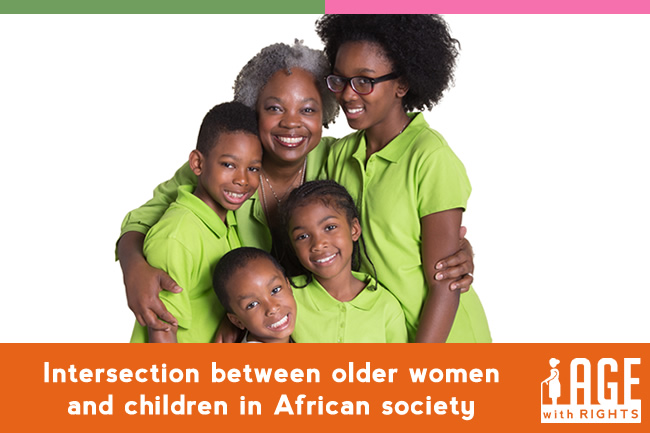Intersection between elderly women and children in contemporary African society
The contemporary African society in which we live is rapidly ageing, especially in the Northern and Southern areas of Africa. Over time, the African family setting has undergone a transition from a generational mutual care system towards a more unilateral relationship between the older generation, especially women, and their children and grandchildren. In the past, the existence of multigenerational structures within the extended family provided a secure and stable environment for the most vulnerable, such as children and the elderly. The older generation found itself in a position of relative privilege, where authority and respect were granted based on the perception that older persons hold wisdom and knowledge.

However, new developments, such as migration to urban areas in search of formal education and job opportunities, have brought an irreversible change to the traditional African society. Older persons no longer hold positions of esteem, and as a result they have seen their roles and relevance be decreased across African society.. Extended families slowly made way to become nuclear families, to the exclusion and marginalisation of the older generation. Therefore, the economic stability of the elderly within the family circle no longer exists.
The impact of HIV/AIDS from the 1990s to date, especially in sub-Saharan Africa, has added a new dimension to the lives of older women. As a result of the widespread impact of HIV/AIDS, many older women have had to take up parental responsibilities towards their orphaned grandchildren, while often times simultaneously nursing their sick adult children. In the absence of a generation of able adults, older women have had to become the bridge that stretches towards vulnerable children in need of care. This practice is generally referred to as kinship care.
In Africa, approximately 90 per cent of children without parental care are taken care of by relatives, in particular, their grandmothers. It is estimated that about 90 per cent of double orphans (children who lost both their parents) in sub-Saharan Africa and 50% of double orphans in Southern Africa live with their extended family. Unlike the case of developed countries of the West, where kinship care has been formalized, in Africa the practice is still informal, receiving little or no attention from the the state. In as much as older women might feel empowered and relevant again in their renewed caregiving role, it is extremely burdensome for older women to take on these responsibilities in the absence of social welfare from the government. This shift back to caretaker comes at a time when the older generation would expect to be cared for by their children and grandchildren.
Notwithstanding the benefits of kinship care compared with foster care (living with a family to whom the child has no prior connection) or institutionalized care (living in an orphanage), the lives of children in kinship care in Africa are disrupted by a plethora of challenges that impact their development and their right to access quality education and healthcare. The majority of children in kinship care on the continent face daily violations of their rights due to the fact that the caregivers are often unable to adequately provide for their daily needs, due to economic or health challenges. This is where the State must assist caregivers in their commitment towards children without parental care. Social assistance programmes and pension schemes that take into account the caretaker role of older women would go a long way to protect the rights of the child and their grandparents.
References:
- UM Assim UNDERSTANDING KINSHIP CARE OF CHILDREN IN AFRICA: A family environment or an alternative care option? (2013)
- Global ageing. Ageing in Africa, available online at http://www.global-ageing.eu/agafrica.html
- B Bigombe & GM Khadiagala MAJOR TRENDS AFFECTING FAMILIES IN SUB-SAHARAN AFRICA, available online at http://www.un.org/esa/socdev/family/Publications/mtbigombe.pdf
- TM Nhongo, HelpAge International’s Regional Representative for Africa, The Ageing in Africa Conference, Johannesburg (2004) THE CHANGING ROLE OF OLDER PEOPLE IN AFRICAN HOUSEHOLDS AND THE IMPACT OF AGEING ON AFRICAN FAMILY STRUCTURES, available online at http://archive.kubatana.net/docs/hivaid/helpage_impact_of_ageing_0408.pdf
- AN Lumun THE CHANGING PRIVILEGES AND CHALLENGES OF OLDER PEOPLE IN CONTEMPORARY AFRICAN SOCIETY, 2013 Global Journal of Art, Humanities and Social Sciences Vol 1, No 4, 34-43, published by European Journal of Accounting Auditing and Finance Research (www.ea-journals.org) 34, available online at http://www.eajournals.org/wp-content/uploads/The-Changing-Privileges-and-Challenges-of-Older-People-in-Contemporary-African-Society.pdf

